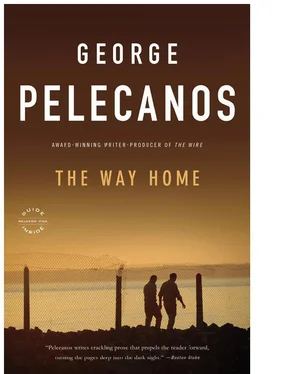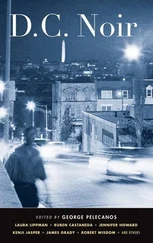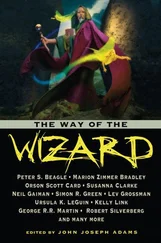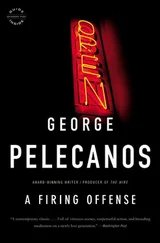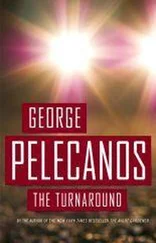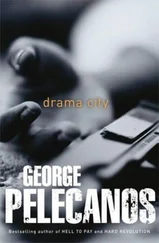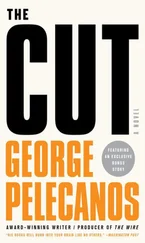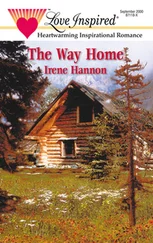George Pelecanos - The Way Home
Здесь есть возможность читать онлайн «George Pelecanos - The Way Home» весь текст электронной книги совершенно бесплатно (целиком полную версию без сокращений). В некоторых случаях можно слушать аудио, скачать через торрент в формате fb2 и присутствует краткое содержание. Жанр: Криминальный детектив, на английском языке. Описание произведения, (предисловие) а так же отзывы посетителей доступны на портале библиотеки ЛибКат.
- Название:The Way Home
- Автор:
- Жанр:
- Год:неизвестен
- ISBN:нет данных
- Рейтинг книги:4 / 5. Голосов: 1
-
Избранное:Добавить в избранное
- Отзывы:
-
Ваша оценка:
- 80
- 1
- 2
- 3
- 4
- 5
The Way Home: краткое содержание, описание и аннотация
Предлагаем к чтению аннотацию, описание, краткое содержание или предисловие (зависит от того, что написал сам автор книги «The Way Home»). Если вы не нашли необходимую информацию о книге — напишите в комментариях, мы постараемся отыскать её.
The Way Home — читать онлайн бесплатно полную книгу (весь текст) целиком
Ниже представлен текст книги, разбитый по страницам. Система сохранения места последней прочитанной страницы, позволяет с удобством читать онлайн бесплатно книгу «The Way Home», без необходимости каждый раз заново искать на чём Вы остановились. Поставьте закладку, и сможете в любой момент перейти на страницу, на которой закончили чтение.
Интервал:
Закладка:
That night, Flynn and Amanda ate a meal at home and turned in early. Amanda slipped under the covers and turned her back to her husband. He listened to her sob quietly and when her breathing evened out he knew she had fallen asleep. But he couldn’t sleep or even close his eyes. He got off the bed and, in his boxers, went downstairs to the dining room, poured bourbon into a tumbler, and drank it down neat. He poured two more fingers from the bottle and took it out to the living room and stood by the mantel over the fireplace, where Amanda had set up framed photographs, the usual array of family and friends.
Thomas Flynn looked at an old photo, taken at the annual St. Patrick’s Day parade down on Constitution Avenue, when Chris was two years old. Thomas had put Chris up on his shoulders so he could see above the crowd, and Chris’s tiny hands were wrapped around his father’s thick index fingers. And then there were those days that Flynn would ride his old Nishiki ten-speed on the bike path of Rock Creek Park, Chris strapped into a seat mounted over the rear tire, a smile on his chubby face as the wind hit it and blew back his hair, Flynn reaching behind him and squeezing Chris’s hand. Flynn could feel the warmth of those hands, the way they clung to him, even now. He remembered how proud he had been the day of the parade, how proud he was to have people see him and his son together on that bike, how certain he was then of his role as provider, protector, and father.
It was no longer about Chris’s disturbing behavior, or his indifference to fitting into society, or his trouble with the law, or his marijuana use, or the embarrassment Flynn felt around the friends and acquaintances whose sons and daughters had stayed on track and were heading for college.
Chris was in prison. It felt final and irreversible, and Flynn did not know what to do.
He placed his empty tumbler on the mantel and listened to the tick of the clock mounted on the wall. It was very quiet in the house.
Chris Flynn had spent nearly every night of his life here on Livingston Street. Now it was as if he had never lived here at all. There would be no muffled sounds of the television behind his closed bedroom door, no floor-rumbling bass of his stereo, no low chuckle as he talked on the phone with his girl, no heavy, clumsy footsteps on the stairs. Chris was gone, and the silence he had left behind was a scream in his father’s ears.
It was 1999. Chris was seventeen the day he entered juvenile prison. Thomas Flynn was thirty-nine years old.
PART TWO
UNIT 5
FIVE
The guards called it a room, but it was a cell. To name it anything else was a lie.
It was a six-by-nine-foot space containing a floor-bolted cot and thin mattress, a particleboard desk and chair, and a steel shitter and piss hole. There was a barred window giving to a view of a dirt-and-mud field, leading to a twelve-foot-high fence topped with razor wire. Beyond the fence was a forest of oak, maple, wild dogwood, and weed trees, but no pines. The door to the cell held Plexiglas in its cutout. Comically large Joliet keys, so named because they were originally manufactured for use in Illinois’s Joliet prison, unlocked the steel doors.
Wake-up was at 6:30 a.m., then group showers, check-in, and breakfast. Then school, 8:30 to 2:00, Monday through Friday. Regularly scheduled recreation, canceled as often as it occurred, dinner, visiting hours, and psychiatric counseling with staff who barely spoke English. The intended illusion was of routine, just like for boys on the outside.
There were a dozen units housing offenders of various degrees of criminality. The most violent boys, those convicted of second-degree murder and manslaughter, and sexual offenders, who were few, were housed together in Unit 12. That they were designated with the highest number, putting them by implication at the top of the pecking order, was a distinction not lost on the other inmates.
Chris Flynn lived in Unit 5, an L-shaped, low-slung brick building, with fourteen other young men. The residents of each unit wore the same color polo shirts, short sleeves in the summer, long in the winter, and system-issue khakis. They were allowed to wear lace-up shoes and sneaks. Their shirts had distinct colors so that an inmate could quickly be identified by his unit. The boys from Unit 5 wore maroon.
Classes were held in a building the size of a small-town elementary school. It was set apart from the housing units, close to another building that held a cafeteria that sometimes doubled as an auditorium, complete with stage. The warden and other administrators, including the central guard detail, kept offices in a separate structure.
The classrooms looked like the classrooms at Chris’s former high school, each with a blackboard, a cluster of old chairs, an opaque projector that only one kid admitted knowing how to operate, and the usual silhouette cutouts of Frederick Douglass and George Washington Carver that the boys spit on and occasionally ripped off the wall. Teachers came to work every day, same as any other teachers, but faced more resistance and saw less progress or success. Chris could not imagine why anyone would want that job and guessed that these folks were do-good types, people his father called “crunchy granolas.” What he didn’t know was that Pine Ridge was a dumping ground for teachers who could barely cut it in the D.C. public school system.
“Does anyone know who the president of the United States was at the time of Martin Luther King’s assassination?” said the teacher, Mr. Brown, a young black dude the boys called Mr. Beige, on account of he talked white. Mr. Brown’s clothes were threadbare, further lowering his status in the boys’ eyes.
“Roosevelt,” said Luther, a boy who talked incessantly to hear his own voice and always gave the wrong answers.
“That’s incorrect, Luther.”
“Coolidge, then.”
“Gump,” said a boy wearing blue in the back of the room. “Boy, you just naming high schools.”
They were in history class, the maroon shirts of Unit 5 mixed in with the navy blue shirts from Unit 9.
“No, it’s not Calvin Coolidge, either. But nice try, Luther. Anyone else?”
Chris thought he knew the answer. He was certain Ali knew. Sure enough, when Chris turned his head and looked at him, Ali Carter, seated at the desk-chair beside him, was staring down at the floor, mouthing the word Johnson.
Ali was smooth skinned, handsome, with a swollen upper body built by doing push-ups in his cell and dips wherever he could. He wore eyeglasses, which somewhat lessened the effect of his bulldog chest, and at five-foot-six was one of the shorter boys at the facility. Ali was in on an armed-robbery conviction.
“Nobody?” said Mr. Brown. “Okay. It was President Johnson, also known as LBJ. Who knows what those initials stand for?”
“Lonnie’s Big Johnson,” said Lonnie Wilson, a horn dog who tended to turn any conversation toward pussy or his dick.
“It ain’t near as big as mine,” said a boy.
A seated guard, one of two stationed in the room, chuckled, his fat moving gelatinously on the action. The other guard, a tall older man named Lattimer, who the boys called Shawshank because he looked like the graybeard in that movie, told Lonnie to watch his mouth and show respect.
“President Johnson and Martin Luther King had a cordial but sometimes rocky relationship during the civil rights era,” said Mr. Brown.
“A sex relationship?” said one of the boys, and several of the others laughed.
“That’s enough,” said Lattimer.
“Perhaps ‘rocky’ is too strong a term. It’s probably more accurate to say that their relationship was one of guarded respect,” said Mr. Brown, gamely plowing ahead. “Understandably, Dr. King became increasingly frustrated with the slow progress in achieving his goal of racial equality in America, and was also frustrated with the escalation of the Vietnam War… ”
Читать дальшеИнтервал:
Закладка:
Похожие книги на «The Way Home»
Представляем Вашему вниманию похожие книги на «The Way Home» списком для выбора. Мы отобрали схожую по названию и смыслу литературу в надежде предоставить читателям больше вариантов отыскать новые, интересные, ещё непрочитанные произведения.
Обсуждение, отзывы о книге «The Way Home» и просто собственные мнения читателей. Оставьте ваши комментарии, напишите, что Вы думаете о произведении, его смысле или главных героях. Укажите что конкретно понравилось, а что нет, и почему Вы так считаете.
